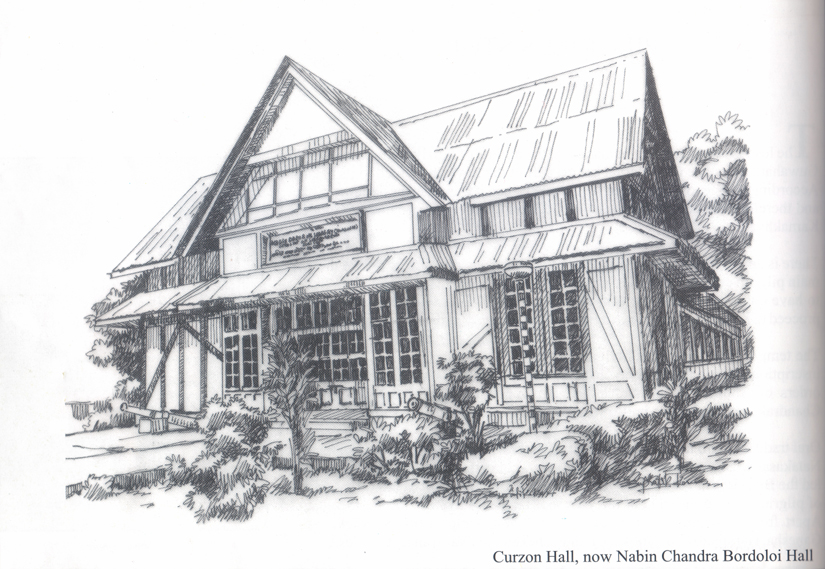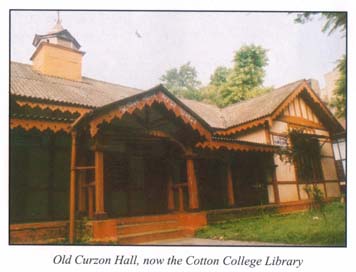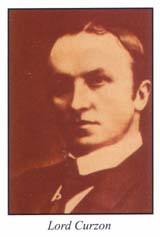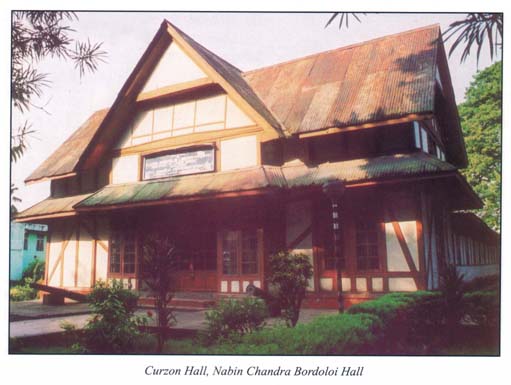| CHRONICLER OF HISTORY |
 |
Until the beginning of the 20th century the Arya Natya Samaj was the only public hall in the town. No doubt a section of educated Assamese gentlemen were pondering over the idea of construction another, but no concrete steps had been taken till then. Meanwhile, in 1892, the Quinton Memorial Hall was established at Shillong, thus encouraging the enlightened people to demand a similar institution in Guwahati.
|
Opportunity came when Lord Curzon decided to visit Assam in March 1900. In order to felicitate him a public reception committee was formed and Rs 14,000 -- a substantial amount in those days -- was collected. Manick Chandra Baruah was an important office bearer of the committee and he suggested that instead of spending the entire amount in decoration, fireworks and fanfare, something more concrete should be done to commemorate the Governor General’s visit. In a preparatory meeting of the reception committee, he said, “Assam is poor. We must not be extravagant in according reception to the Crown’s representative. The ceremony should be simple and sober. Instead of spending the entire money in fanfare, something permanent for public utility should be done to perpetuate the memory of Lord Curzon, which should be done to perpetuate the memory of Lord Curzon, which should be named after him.”
|
|
|
|
Thereafter Baruah gave a special proposal to construct a public hall that was supported by Jagannath Barua and Rai Saheb Bhuban Ram Das who were also members of the reception committee. Chief Commissioner J B Fuller and Commissioner Henry Gordon also appreciated the idea of constructing a hall to be named after Lord Curzon and requested Baruah to expedite the work. When Chief Commissioner Fuller communicated the decision regarding the name of the hall, Lord Curzon expressed immense satisfaction. It also found a place in Curzon’s diary. A surplus of Rs 6000 came in hand of the reception committee after meeting all expenditure of Lord Curzon’s visit. Some differences of opinion about the site of the proposed hall did arise initially, with some members suggesting that the hall be located in Uzan Bazar, and others proposing that it be constructed near Fancy Bazar ghat. Finally however, issues were settled and Manick Chandra Baruah took up the project in right earnest. He arranged for land near the old dak |
bungalow in Panbazar and proceeded with the construction work. Considering the fact that the hall was to be constructed with public money, he suggested that the Public Works Department take up the job. Accordingly, the PWD completed the work and in 1900 a new public hall named the Curzon Hall came into existence.
When Lord Curzon arrived at the Northbrook Gate, he was given a warm welcome and the town’s people expressed their loyalty to the British government. Satyanath Bora read out the welcome address in Assamese while Jagannath Baruah read out its English version. Struck by the warmth and spontaneity of the welcome at Guwahati, Curzon announced that steps were being taken to expedite the railway line work on both banks of the Brahmaputra. He further assured provincial representation “from whatever section of the community when called for the legislative programme of the government”.
As Cotton College began to expand, its authorities and the district administration felt that a public hall adjacent to the college was affecting its tranquility. Again it was Manick Chandra Baruah who located a suitable spot near Dighalipukhuri and took initiative to purchase it from its owner. A hall measuring 100 ft by 30 1/2 ft was now constructed from a special budgetary provision of the government, and in 1912 the Curzon Hall and Library was shifted to this building. The old building located near the general post office now houses the Cotton College library.
|
The Curzon Hall that was renamed the Nabin Chandra Bordloi Hall in 1953 by Assam Chief Minister Bishnu Ram Medhi has been witness to many historic events and is a symbol of pride for the town. Even until the 1960s most important meetings of the town used to be held here. When Assam’s former Chief Commissioner Henry Cotton came to Guwahati in 1914, this time as president of the Indian National Congress, it was at this hall that a public reception was held.Rabindranath Tagore was also given a public reception at Curzon Hall when he visited Guwahati in 1919. P C Roy, Sir Ashutosh Mukherjee, Subhash Chandra Bose, Jai Prakash Narayan, C R Das, C F Andrews visited and delivered lectures here. At the time of World War II it was used as a base for military operations. Interestingly, for some time it was also used as the central examination hall of Cotton College. |
|


